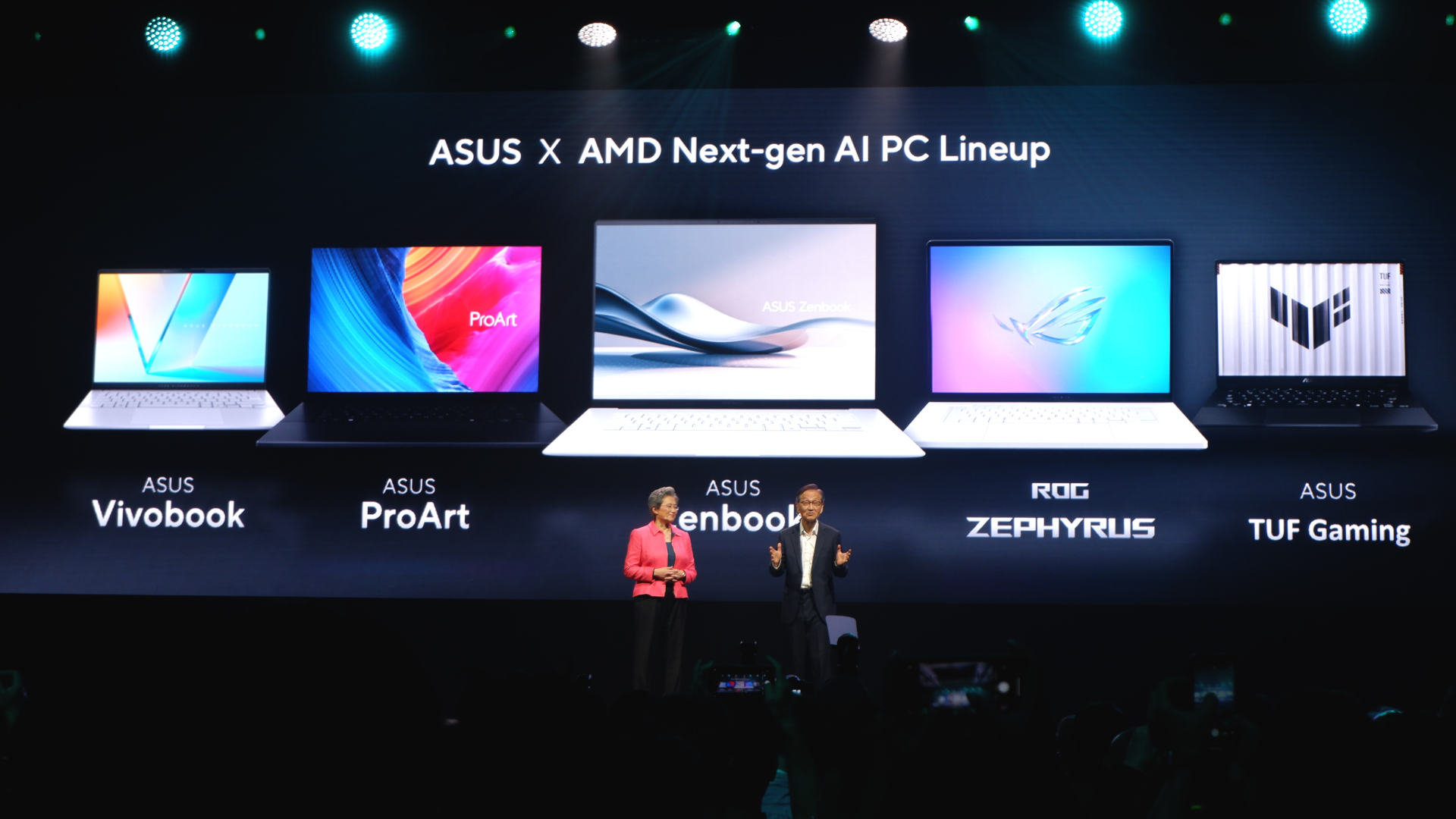AMD is right about AI PCs being 'the biggest change in the PC form factor in the last decade' but it's not because of AI
Good competition drives innovation and development, not fads and phrases.

In a Q&A session after AMD's keynote speech, CEO Dr Lisa Su was asked what AI meant for the computer industry as a whole. Her response was naturally very ebullient towards artificial intelligence and even went as far as saying that so-called AI PCs are "probably the biggest change in the PC form factor in certainly the last decade." Given the wealth of new chips, system designs, and AI-badged products showcased at Computex 2024, it's hard to entirely disagree with this statement but, arguably, the AI boom itself isn't responsible for this change.
The appearance of the NPU—a collection of cores dedicated to neural network calculations—inside processors from AMD, Intel, and Qualcomm is only present because of AI, of course, and it's certainly the new battleground for bragging rights when it comes to who can make the most power-efficient NPU or the one with the most TOPs.
Microsoft's Copilot+ AI PC ecosystem is hell-bent on making us all think that life before AI was impossibly complex and tedious, and the new laptops that meet Microsoft's criteria will make all the difference.
But truthfully, that's about the sum of what AI has really done for big changes we've seen in all the announcements and launches at Computex. Take CAMM2 as a perfect example: Initially developed by Dell and then extended and standardised by JEDEC, this new form factor for DRAM not only means laptops can be slimmer, faster, and a little easier to keep cool but it's also being transported to the desktop market, allowing for DDR5 speeds way faster than what we're currently limited to.
One company's innovation has become a launch pad for making a big step forward in the whole PC industry.
Likewise, Qualcomm's Arm-based Snapdragon X processors. We've had laptops running Windows-on-Arm for many years now, but they've all failed to make any serious headway against x86 machines. That looks set to completely change and although this is partly down to the fact that Snapdragon X laptops are the first Copilot+ AI PCs, it's more because they're able to run x86-developed applications and games very well.
Though it's not the same thing, I feel that it's in a similar vein to the success of the Steam Deck. That device uses x86 components and runs games developed for Windows-based PCs, and yet its operating system is Linux-based.
Keep up to date with the most important stories and the best deals, as picked by the PC Gamer team.

Valve's software engineers have done sterling work in getting it all to work almost perfectly—not every Windows game will run on the Steam Deck but there's no shortage of great games to choose from that do.
The boom in handheld gaming PCs is thanks to the Steam Deck and it's a PC form factor that many of us are turning to, rather than the traditional laptop, for mobile gaming. It also has nothing at all to do with AI PCs.
AMD and Intel's latest CPU architectures (Zen 5 and Lunar Lake) are both significant improvements on previous designs, on paper at least, and while both companies banged the AI drum so hard at Computex you probably heard it at home, the majority of the updates have little to do with AI. The NPU parts, obviously, but not the core architectures.
One company's innovation has become a launch pad for making a big step forward in the whole PC industry
The ancient combatants in the chip industry have been forced to up their game because they're facing proper competition from Qualcomm and, next year, perhaps Nvidia as well. If the latter two decide they want to properly compete in the general x86 workstation and server CPU markets, AMD and Intel will need to be even more innovative.
Even little things, like conjoined cooling fans or wireless RGB controllers, which are very minor steps forward in the grand scheme of things, are all going to be welcomed by the PC enthusiast market and none of them cast a single nod at the AI bandwagon bludgeoning its way past. A Windows laptop that can last all day on a single battery charge? Thank the efficiency of Arm, not AI.
None of this is to say that there aren't some genuine AI-based innovations (Nvidia's G-Assist is honestly one of them) but few, if any, are 'AI PC' things. As much as Microsoft would like everyone to think that AI PCs and Copilot+, or AMD and Intel with their NPUs, herald a new era for the PC form factor, it's just good old-fashioned competition that's responsible for the changes we're seeing.

Catch up with Computex 2024: We're on the ground at Taiwan's biggest tech show to see what Nvidia, AMD, Intel, Asus, Gigabyte, MSI and more have to show.
Well, that and the fact that PC sales were in decline for years and are still very sluggish. Hardware that's barely any better than the previous generations is hard to promote to a market that's saturated with products and to customers struggling to justify spending hard-earned money.
While I suspect AI PCs will probably sell quite well, to begin with, once customers realise that there's nothing especially great about AI at the moment, shipments will trail off again.
But then as the rest of the innovations kick in, and the humble PC becomes markedly better than ever (more performance, less heat, longer battery life, better gaming on the go—take your pick), sales should start to climb again. I don't expect AI to ever disappear from our PC lives but the 'AI PC' should thankfully be short-lived.

Nick, gaming, and computers all first met in 1981, with the love affair starting on a Sinclair ZX81 in kit form and a book on ZX Basic. He ended up becoming a physics and IT teacher, but by the late 1990s decided it was time to cut his teeth writing for a long defunct UK tech site. He went on to do the same at Madonion, helping to write the help files for 3DMark and PCMark. After a short stint working at Beyond3D.com, Nick joined Futuremark (MadOnion rebranded) full-time, as editor-in-chief for its gaming and hardware section, YouGamers. After the site shutdown, he became an engineering and computing lecturer for many years, but missed the writing bug. Cue four years at TechSpot.com and over 100 long articles on anything and everything. He freely admits to being far too obsessed with GPUs and open world grindy RPGs, but who isn't these days?

